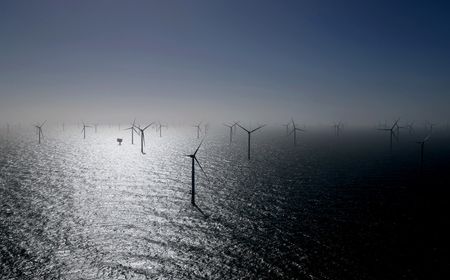FRANKFURT (Reuters) -Germany left installed offshore power wind capacity unchanged in the first half of 2025 and industry groups on Wednesday urged the government to introduce improved auction measures this year to ensure more turbine additions.
As of June 30, 2025, the country had 9.2 gigawatts (GW) of installed offshore capacity, unchanged from Dec. 31, 2024, but 1.9 GW of new turbines are under construction, said consultancy Deutsche WindGuard, commissioned by the lobbies to gather data.
“Offshore wind energy plays a central role in the success of the energy transition,” said a statement signed by six wind and engineering groups including VDMA Power Systems and German wind energy association BWE.
“The industry must be able to rely on maintaining the expansion target of 70 GW by 2045,” it added.
Closer in time, a target of 30 GW by 2030 is theoretically enshrined in law.
Germany wants to derive 80% of its power consumption from renewables such as wind and solar energy by 2030, compared with 54% reached in the first six months of 2025, of which offshore wind accounted for 5%.
Some 3.6 GW of offshore wind capacity has received final investment decisions and a further 17.5 GW have been awarded permits but not been allocated by investors, WindGuard’s research showed.
But the lobby groups said that for these plans to materialise, the industry needs Europe-wide aligned revenue models, and longer realisation horizons, at least 12 months rather than six, in reflection of longer sourcing and construction times.
An overhaul of the auction design should also consider introducing Contracts for Difference (CfDs), which are fixed-price power contracts that guarantee long-term revenue streams.
Developers were unhappy with risks related to bottlenecks in supply chains and to “overplanting,” a method to allocate proportionally more generation capacity to transmission lines in order to better utilise connecting cables, they said.
Overplanting was too rigid and developers should be allowed more flexibility tailored to individual sites, they said.
(Reporting by Vera Eckert, editing by Alexandra Hudson)











